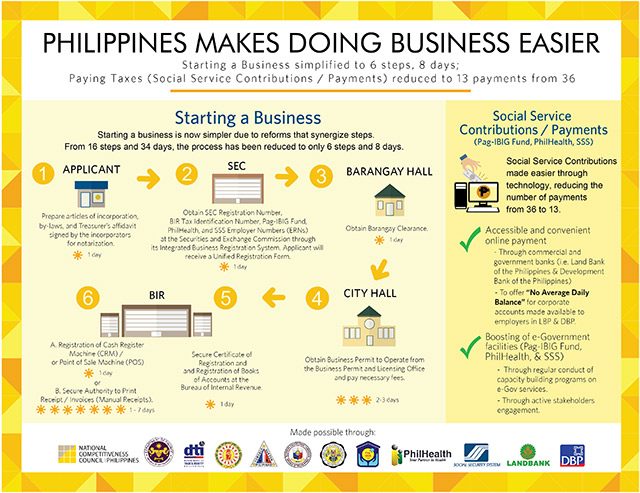SUMMARY
This is AI generated summarization, which may have errors. For context, always refer to the full article.

MANILA, Philippines – Government agencies announced reforms eyed to dramatically simplify the process of starting a business in the country.
The reforms promise that starting a business would only take 8 days and require 6 steps, down from the currently required 34 days and 16 steps.
The package of reforms include merging several steps together to create single-window applications powered by more interconnectivity across IT systems of different agencies; the removal of several outdated procedures; and the introduction of enhanced one-stop-shop procedures in local government units.
The changes involved coordination and partnership across numerous government agencies such as the Securities and Exchange Commission (SEC), Bureau of Internal Revenue (BIR), Social Security System (SSS), Home Development Mutual Fund (Pag-IBIG), Philippine Health Insurance Corporation (PhilHealth), and the local government unit (LGU) of Quezon City.
Once the reforms are in place, it will only take 6 steps and 8 days to incorporate new corporations, partnerships, and non-stock corporations, down from the current 16 steps and 34 days.
The initial roll out of the reforms will be at the SEC’s Manila office Wednesday, April 15, where most companies are incorporated. Roll outs will continue in succeeding months across all SEC offices and a full online system will be made available by 2016.
Online payments for Pag-IBIG, PhilHealth
Meanwhile, payroll-related payments to Pag-IBIG and PhilHealth are being moved online for companies employing more than 10 employees.
Payments to SSS have already been moved online for companies with more than 10 employees since 2014. Online banking facilities at Land Bank of the Philippines (LBP) and the Development Bank of the Philippines (DBP) that require no minimum average daily balance for these transactions are being made available for enterprises, thus eyed to reduce the number of payments from 36 to 13 per year, representing major time and cost savings for businesses and entrepreneurs.
This simplified procedure would be further eased by 2016, when the option of doing registering online becomes available, they said Tuesday, April 14.
The National Competitiveness Council (NCC) spearheaded the creation of these reforms in collaboration with the Department of Finance (DOF), Department of Trade and Industry (DTI), the Securities and Exchange Commission (SEC), and 9 other institutions signing a memorandum of understanding that kicked off the rollout.

Improving PH global competitiveness
Improving the economy’s global competitiveness was the primary motivation for the reforms.
Per World Bank’s ranking of countries in terms of ease of doing business, it showed that in the Philippines, it would take 34 days to open a business; 42 days to get electricity power; and 15 days and $915 to import a container. (READ: Philippines is 95th ‘best place’ to do business – WB report)
In contrast, in the world’s best place to run a business such as Singapore, entrepreneurs need just 2.5 days to open a business, 31 days to get electric power, and 4 days and $440 to import a container. (READ: Singapore, New Zealand, Hong Kong best for business)
“We’re inching closer to our goal of being in the top 3 of countries polled in global competitiveness rankings after being stuck in the bottom for many years,” NCC Co-Chairman Guillermo M. Luz said.
As recently as 2011, the country ranked in the bottom 3 of global rankings, he added.
Luz mentioned that the past 4 years has seen the country steadily climb the rankings of various global competitiveness reports.
The Philippines gained 33 places on the World Economic Forum (WEF) Global Competitiveness Report and 49 on the Corruptions Perceptions Index done by Transparency International within that span, he said.
He also mentioned that the country gained 53 places in the same timeframe on the latest World-Bank – International Finance Corporation ease of doing business report.
There is some controversy surrounding the country’s ranking in 2014 as World Bank changed its methodology, thus the Philippines slid to 95th spot from 86th in terms of ease of doing business.
The NCC maintains though that the country actually gained 13 places in 2014 from 108th place in 2013.
The Philippines has been the most improved economy in the last 3 years in each report, Luz said.
Trade Secretary Gregory Domingo said that there is a very good chance that the introduction of these reforms will propel the country into the top 3 of the economies in the next World Economic Forum Global Competitiveness Report.
Last year’s report had the Philippines in 52nd place out of 144 countries surveyed, up from 57th in 2013. – Chris Schnabel/Rappler.com
Add a comment
How does this make you feel?
There are no comments yet. Add your comment to start the conversation.